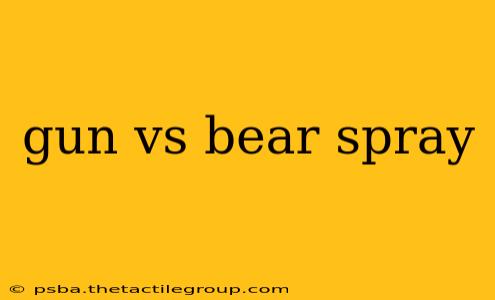Encountering a bear in the wild is a terrifying prospect, and choosing the right defense method is crucial for survival. While firearms are a popular choice for many, bear spray offers a compelling alternative with significant advantages. This article will delve into a comprehensive comparison of guns versus bear spray, helping you make an informed decision based on your skills, experience, and the specific risks involved.
Understanding the Risks: Bear Encounters and Defense Strategies
Before comparing specific defense tools, it's important to understand the realities of bear encounters. Most bear attacks are defensive in nature, triggered by surprise or perceived threat. Understanding bear behavior and employing proactive avoidance strategies is the best defense. This includes making noise while hiking, storing food properly, and knowing how to react when you see a bear.
Gun as Bear Deterrent: Advantages and Disadvantages
A firearm, particularly a large-caliber handgun or rifle, offers undeniable stopping power. A well-placed shot can incapacitate a bear, potentially saving your life.
Advantages:
- Stopping Power: A gun delivers the most immediate and potentially lethal force.
- Range: Firearms offer a greater effective range than bear spray.
Disadvantages:
- Requires Extensive Training and Practice: Accurate and effective use under stress requires extensive training and regular practice. A missed shot can escalate the situation.
- Legal Ramifications: The legal implications of using a firearm in self-defense against a bear vary significantly by location. You need to understand local laws and regulations thoroughly.
- Ethical Considerations: Killing a bear should be a last resort, and using a firearm may lead to ethical concerns for some individuals.
- Accuracy Under Pressure: In a high-stress situation, hitting a moving target is extremely challenging, even for experienced shooters.
- Risk of Collateral Damage: Misdirected shots pose a risk to yourself and others.
Bear Spray: A Powerful and Effective Alternative
Bear spray is a non-lethal deterrent that utilizes a concentrated capsaicinoid solution to incapacitate a bear temporarily. Its effectiveness is widely documented and supported by extensive research.
Advantages:
- Ease of Use: Bear spray is relatively simple to deploy, even under pressure. The spray pattern covers a wider area than a gunshot.
- Non-Lethal: It incapacitates the bear temporarily, allowing you to escape without causing harm to the animal.
- Widely Available: Bear spray is readily available in many outdoor gear stores.
- Legal Considerations: Bear spray is generally legal in most areas where bear encounters are common.
- Environmental Impact: It doesn't involve harming the bear or the surrounding environment.
- Effectiveness: Extensive studies show a high success rate in deterring bear attacks.
Disadvantages:
- Limited Range: Bear spray has a shorter effective range than a firearm.
- Wind Sensitivity: The effectiveness of bear spray can be reduced by wind conditions.
- Requires Proper Deployment: Knowing how to deploy the spray correctly is crucial for its effectiveness.
The Verdict: Choosing the Right Defense Tool
The "best" defense tool depends heavily on individual factors. If you are highly skilled with firearms, comfortable with the legal and ethical implications, and have practiced extensively, a firearm may be a viable option, particularly in areas with high bear populations and aggressive bear behavior.
However, for most people, bear spray offers a more practical and effective defense. It's easier to use, non-lethal, and requires less training. The superior ease of use, non-lethal nature, and higher success rate in deterring attacks make bear spray a very compelling choice for self-defense.
Ultimately, the most important defense strategy remains bear awareness and avoidance. Knowing how to act responsibly in bear country—making noise, carrying bear spray, and knowing the proper safety protocols—is the best way to ensure a safe and enjoyable outdoor experience.

